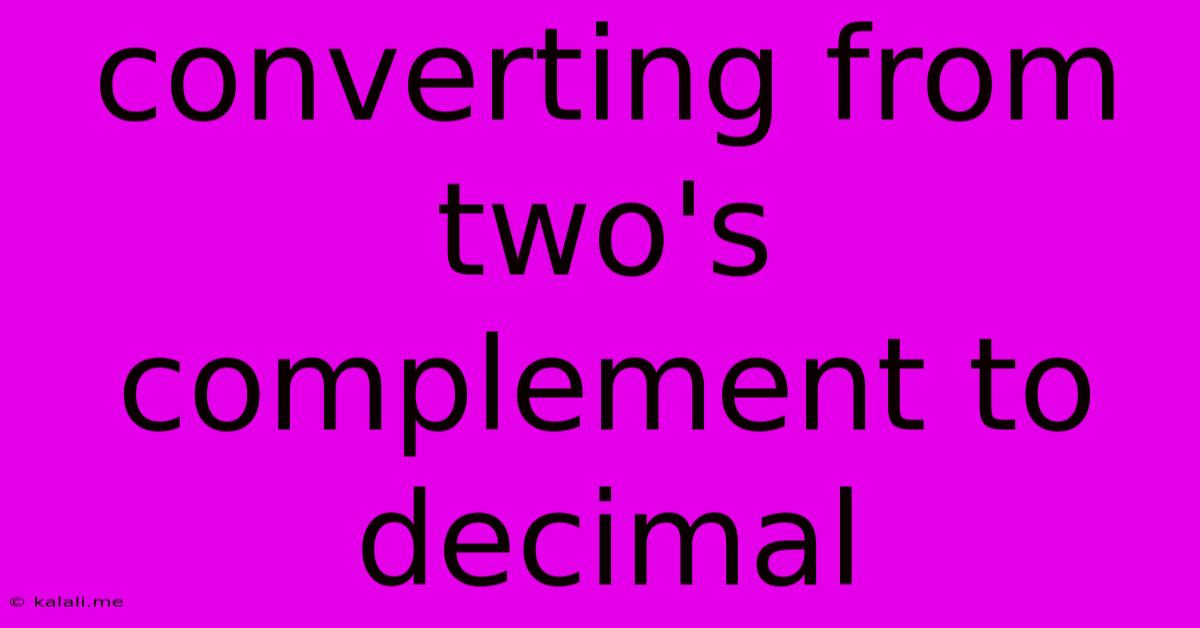Converting From Two's Complement To Decimal
Kalali
May 31, 2025 · 3 min read

Table of Contents
Converting Two's Complement to Decimal: A Comprehensive Guide
Meta Description: Learn how to easily convert two's complement binary numbers to their decimal equivalents. This comprehensive guide covers the process step-by-step, including handling negative numbers and different bit lengths. Master this essential skill for computer science and digital electronics.
Two's complement is a crucial concept in computer science and digital electronics, representing both positive and negative integers using binary numbers. Understanding how to convert two's complement numbers to their decimal equivalents is essential for anyone working with low-level programming, digital logic design, or computer architecture. This guide will walk you through the process, making it easy to understand and apply.
Understanding Two's Complement
Before diving into the conversion process, let's briefly review what two's complement is. It's a way of representing signed integers (numbers that can be positive or negative) in binary format. The most significant bit (MSB) indicates the sign: 0 for positive and 1 for negative.
Positive numbers are represented in their standard binary form. Negative numbers are represented using the two's complement method:
- Find the one's complement: Invert all the bits (change 0s to 1s and 1s to 0s).
- Add 1: Add 1 to the result of step 1.
This method elegantly handles both positive and negative numbers, simplifying arithmetic operations within the computer.
Converting Two's Complement to Decimal: A Step-by-Step Guide
Let's illustrate the conversion process with examples. We'll cover both positive and negative numbers.
Example 1: Positive Number
Let's convert the 8-bit two's complement number 00001101 to decimal.
Since the MSB is 0, this represents a positive number. To convert to decimal, simply treat it as a standard binary number:
(0 x 2⁷) + (0 x 2⁶) + (0 x 2⁵) + (0 x 2⁴) + (1 x 2³) + (1 x 2²) + (0 x 2¹) + (1 x 2⁰) = 0 + 0 + 0 + 0 + 8 + 4 + 0 + 1 = 13
Therefore, 00001101 in two's complement is equal to 13 in decimal.
Example 2: Negative Number
Now, let's convert the 8-bit two's complement number 11110011 to decimal.
- Identify the sign: The MSB is 1, indicating a negative number.
- Find the one's complement: Invert all the bits:
00001100 - Add 1: Add 1 to the one's complement:
00001101 - Convert to decimal: This is the same as Example 1, resulting in 13. However, since the original number was negative, the decimal equivalent is -13.
Handling Different Bit Lengths
The process remains the same regardless of the number of bits (e.g., 16-bit, 32-bit). The only difference is the range of numbers that can be represented. A larger number of bits allows for a greater range of both positive and negative numbers. Remember to always consider the MSB to determine the sign.
Common Mistakes to Avoid
- Forgetting to add 1: A common error is neglecting to add 1 after finding the one's complement when dealing with negative numbers.
- Incorrectly interpreting the MSB: Always check the MSB to determine if the number is positive or negative.
- Miscalculating the binary to decimal conversion: Double-check your calculations when converting the binary representation to its decimal equivalent.
Conclusion
Converting two's complement numbers to decimal is a fundamental skill in computer science and related fields. By following the steps outlined in this guide and practicing with various examples, you can confidently master this essential conversion process. Remember to pay close attention to detail, especially when handling negative numbers. With practice, this will become second nature.
Latest Posts
Latest Posts
-
What Size Screws 1 2 Inch Drywall
Jun 02, 2025
-
Why Was The Quran Revealed In Arabic
Jun 02, 2025
-
Substituting Brown Sugar For White Sugar
Jun 02, 2025
-
Why Are All The Lights In My House Flickering
Jun 02, 2025
-
How To Call Your Horse In Skyrim
Jun 02, 2025
Related Post
Thank you for visiting our website which covers about Converting From Two's Complement To Decimal . We hope the information provided has been useful to you. Feel free to contact us if you have any questions or need further assistance. See you next time and don't miss to bookmark.